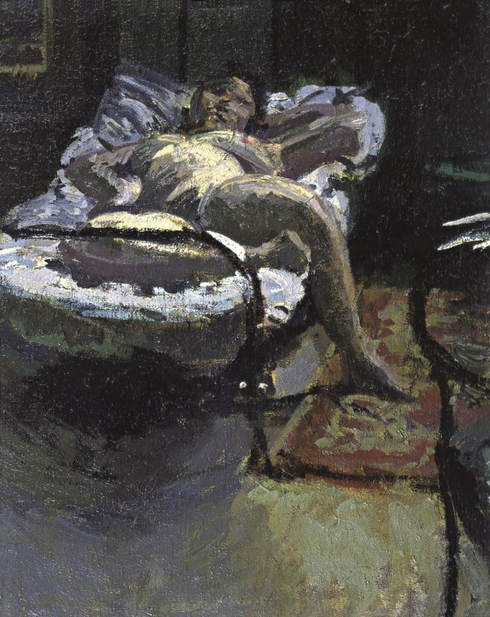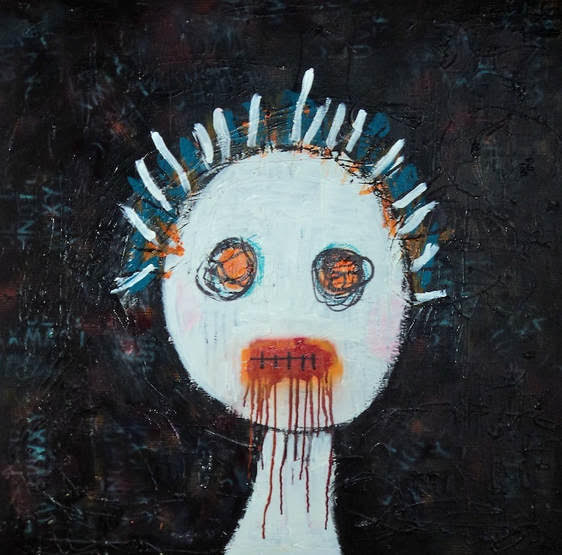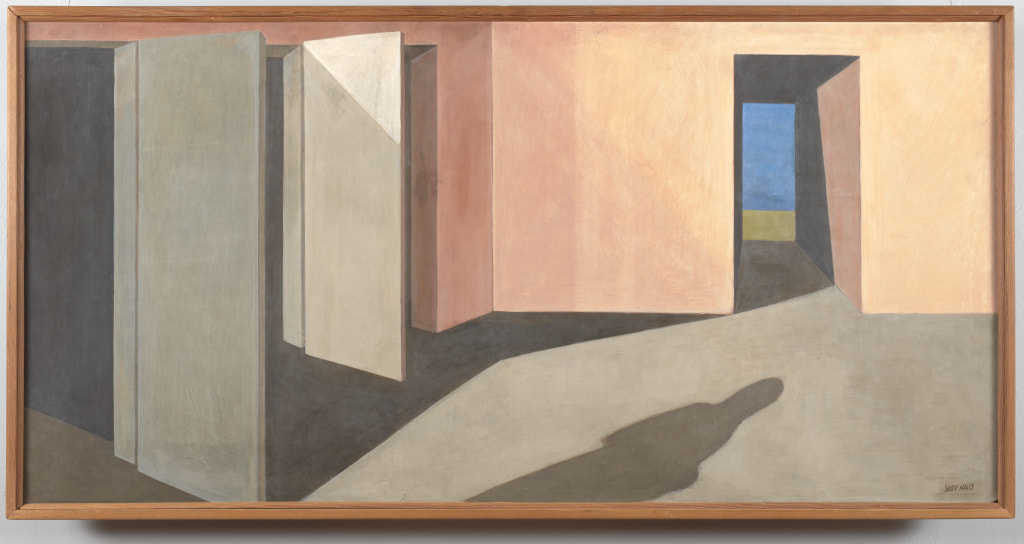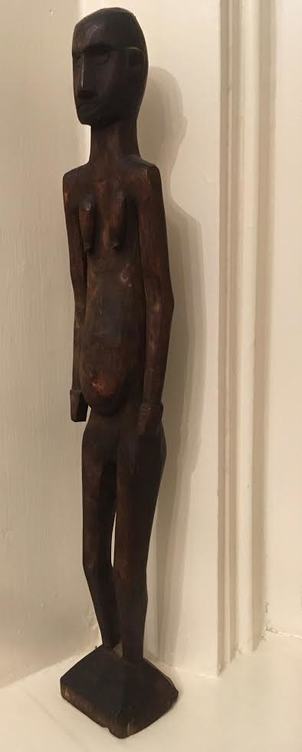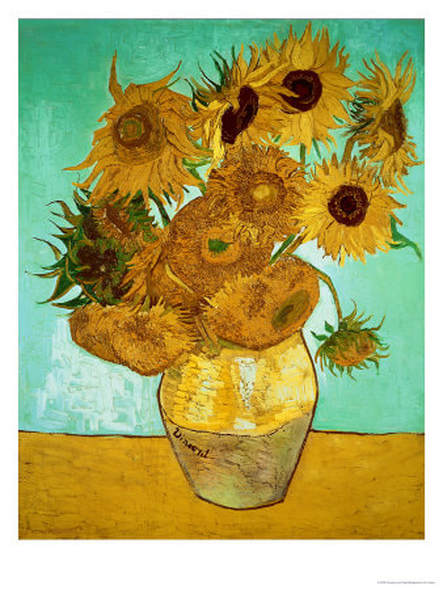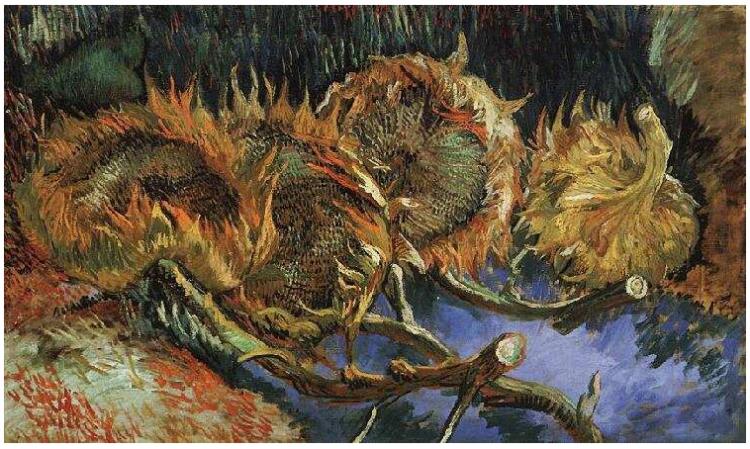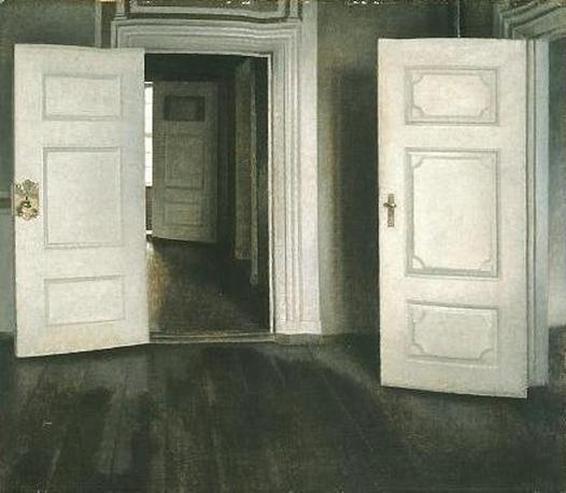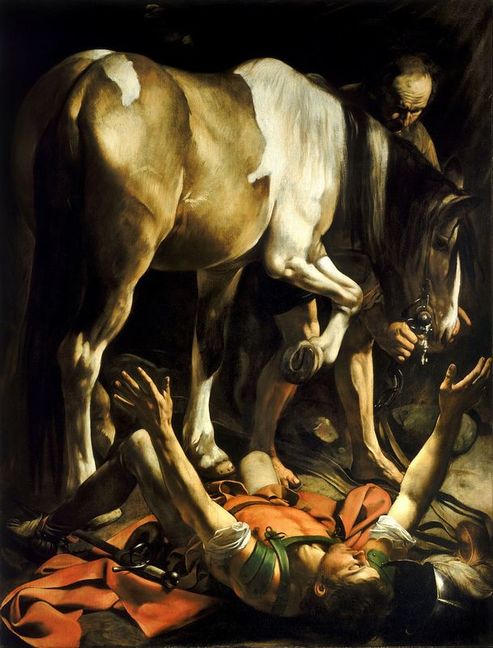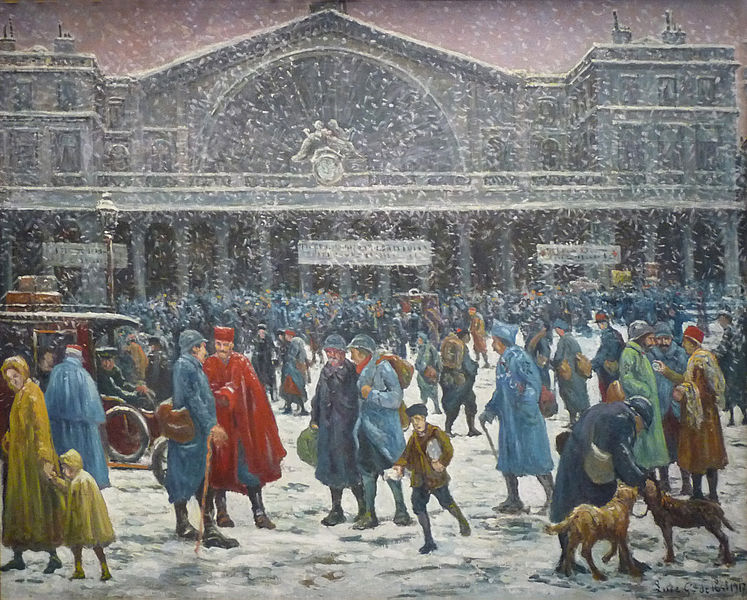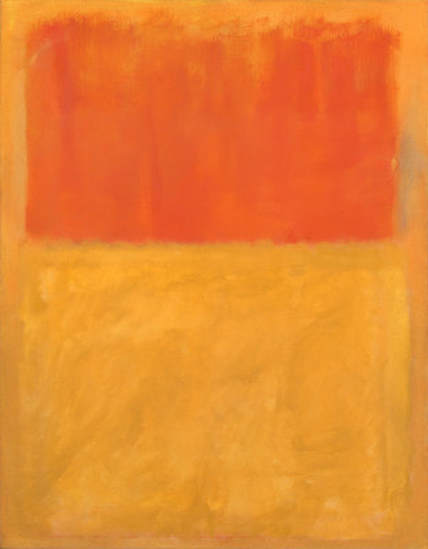|
White Chapel
Mary Jane rang an Irish refrain, drunk on Ten Bells whiskey. Her unpolluted apron ablaze, she surrendered a scarlet shawl and her weary wildgrass heart to the rogue incubus cloaked in the serrated fog, haunting every step of squalid streets, preying on its darkest shadows. She placed the native beauty berries upon her wooden churchyard grave, marked with the Unfortunate’s brand she seared upon her own scars when she abandoned everywhere that could tie her to anyone. In the end, there was nothing she would not do for a fire. Megan Denese Mealor This poem was first published in Jersey Devil Press. Author's note: Inspired by Nuit d’ete, painted by Walter Sickert (1860-1942), an English painter and printmaker who frequented Whitechapel often during the bloody reign of Jack the Ripper in 1888. Nuit d’ete was painted in 1906, and is thought by some conspiracy theorists to be the likeness of fifth victim Mary Jane Kelly, who was discovered in a similar pose on her bed, literally in pieces. Walter Sickert is considered by some to be a good candidate for Jack the Ripper; my personal belief is that he was simply inspired by the killings. Megan Denese Mealor has been writing practically since birth. Her poetry and short fiction have been published in numerous journals, most recently A Long Story Short, The Dying Dahlia Review, and Down in the Dirt. The granddaughter of celebrated Georgia artist Gene Mealor, Megan inherited his fascination with imagery. She lives in Jacksonville, Florida with her partner Tony, son Jesse, and cats JubJub and Trigger.
0 Comments
Meth Widow When you first danced With the White Prince His touch was cold Lightning Sending it's crystals Through your every Vein and nerve Until a million Frost flowers Bloomed in your brain And you spun with him Across the glassy floor Faster and faster Your heart transfixed On the needle Of his cold enchantment Keeping you Locked in his arms Even as the glass floor Splinters And the shards of ice Cut through nerve and flesh You dance with death And cling to him As your body withers Your teeth fall out Your breath turns To corruption Your skin a torment You tear at With desperate fingers Trying to remember Who you were Before your demon lover Mary McCarthy This poem was written as part of the Ekphrastic Halloween surprise challenge. Mary McCarthy has always been a writer, as well as a visual artist and a Registered Nurse. She has been published in many online and print journals, and has an echapbook "Things I Was Told Not to Think About" available as a free download from Praxis magazine online. The Shadow of Choice
A pause. A sigh. A choice. Always a choice. A body blur stands in the foreground, an inchoate shadow. Shapeless, sexless, ageless. And yet, knowing nothing about this formless being, I feel an instant kindredness. The tendrils of universal hesitation wrap around my heart as I sympathize. "Consider this," the artist seems to say. "Consider the broad and easy way, all pink and glowing in the late afternoon sun." For ahead is an open hallway in a rosy wall, no door impediment to ponder. Just a way that waits, a harmless mouth of opportunity. And at the end of this short shadowed hall? The bright blue of Future. The way of Meant to Be. The painting is deceptively simple. All straight lines—vertical, horizontal, diagonal—except for the sacklike lump of shadow. Is it the deception of simplicity that makes our formless friend pause? On the left, in the deeper shadow of choice, lie three more openings; access to the black halls of unknowing. Two white sentries stand guard. Are they doors open in welcome? Will they swing shut and preclude exit once entered? Are they shields? Blockades? Do they beckon or bar the way? Does that depend upon some unrevealed aspect of the shadow body? Shadow casts itself across all choices. There is no way outside the power of its hand, unless no choice is made. To remain in sunlight is to remain frozen in place. The dilemma creeps through my chest, crawls into crannies of what-ifs and who's to say, questions the nature of my nature, the nature of way, the nature of choice. I become the shadow body, caught in eternal indecision. It's not so simple, after all. Renee Soasey Renee Soasey is working toward completion of a BFA in Creative Nonfiction and toward completion of an off-the-grid home in the high desert of Central Oregon. The Gabon Woman
Worn, withered, of wood, the Gabon woman waits. Breastless, ungenitaled, perfectly flat, angularly she waits. With legs disappearing into stone, arms ironed stiff: eyeless, hairless, a perfectly managed wooden way. From the side she is unsure, shoulders pointed skywards asking why? which way? for whose pleasure and profit? Refusing to be found, named, said--to be any other way. Bought, she cannot be owned. Positioned, she declines to stand upright. A page turned face down, a rhythm, she only repeats. Silent, she watches us watch her, each plane a way of arriving at the body: in and out of the frame. Mark Silverberg Mark Silverberg is the author of the Eric Hoffer award-winning ekphrastic poetry collection, Believing the Line: The Jack Siegel Poems (Breton Books, 2013). His poetry has appeared (or is forthcoming) in The Antigonish Review, The Nashwaak Review and Contemporary Verse 2. He is an Associate Professor of English at Cape Breton University where I specializes in American poetry, visual arts, and artistic collaborations. Mexican Codex 16th Century
Those with obsidian blades imagine the gods hungry. How else to justify whet-stones, the time spent honing each avid edge? That the gods might want nothing cannot be thought, for that would leave them as naked as any would-be lover, their cut flowers wilting in their hands. Devon Balwit This poem was written as part of the ekphrastic Halloween poetry challenge. Devon Balwit writes in Portland, OR. She has five chapbooks out or forthcoming: How the Blessed Travel (Maverick Duck Press); Forms Most Marvelous (dancing girl press); In Front of the Elements(Grey Borders Books), Where You Were Going Never Was (Grey Borders Books); and The Bow Must Bear the Brunt (Red Flag Poetry). More of her individual poems can be found here as well as in The Cincinnati Review, The Stillwater Review, Red Earth Review, The Inflectionist; Glass: A Journal of Poetry; Noble Gas Quarterly; Muse A/Journal, and more. Sunflowers “…but I have the sunflower, in a way.” –Van Gogh Oh Vincent, a week before the sun will be blotted from the sky by the moon, your Sunflowers will gather together for the first time since you took brush to palette to canvas over one hundred years ago. One of these was the same painting at which my grandmother tried her hand at as she learned to struggle with oils when I was a child. I read that you painted these to decorate Gauguin’s bedroom for his visit, a guest in your home, and I remember sleeping in the guestroom of my grandmother’s condominium on a blow-up mattress-- red and green plaid, against a navy backdrop. I’m not sure why I need to talk color to you, perhaps because of the importance of it to you in painting the richness of those flowers-- and how you waited for months for the pigments to be shipped so you could paint the same flower again and again. In humid Florida I would wake, the sun rising into a sky-blue sky, the aroma of pine and palm slipping through the slatted windows needing to be cranked open, my hand resting on the cool marble of the sill, and I would turn to see your painting, browns and golds, copper and rose rising from the heads of the flowers, their perfect eyes of green, the fringes of them folding backward into the backdrop of tan stucco walls, having been recaptured by my grandmother’s crepe-skinned hand, and hanging above the floral sofa. Still in nightclothes, we would breakfast on oranges big as the moon, carefully sectioned with a funny little knife. How she tried to paint most mornings, her palette covered with colors knifed together, her tongue almost black with pigment as she gathered the bristles of the brush together in her mouth so that it pointed as you must have. She once captured for me a small scene of a palm, the thin trunk nothing more than a generic line with other lines hatching through the vertical, fronds, thin green triangular strokes—a beach scene, since she lived in Clearwater, where the sand was as light as powder and squeaked beneath our flipflops when we walked. My cousins and I would walk to the beach every day at dusk to catch the sunset; the sun, a fiery orange dipping its toes into the ocean nightly, until it fell beneath the horizon separating water from sky. I still remember the elevator in her building as our tiny kid fingers would press button after button, until they glowed round, and how she would laugh as we stopped on every floor, the smell of machine oil and Coppertone filling it. My grandparents went there to retire, selling their house in New York City to move to a world free of traffic, free of people rushing from home to work, from work to home, and back again. How free they must have felt in their new location. How free you must have felt after Arles. We seldom spoke about my other grandmother. Like you, she was bi-polar, and never took her medication on time and when she did, she chased her Valium with Lithium, drank Screwdrivers and smoked Belairs until blue smoke filled the kitchen where she burned pie after pie made from the fruit of her rotting orchard. She would have understood your desire for perfection in those sunflowers-- the dried crumpled leaves folding over themselves again and again as you painted them over in various shades of brown and tan, rose and gold, slipping from their vase. Once a rat swam beside me in her unkempt swimming pool, his face pink and puckered with white whiskers twitching among the early fallen autumn leaves; she caught it in a net and beat it to death in front of me. To prevent more from coming out, she blocked the hole in the cracked blue concrete wall with a round batting of steel wool. She never moved, staying in the same place for years, marrying again, and again, trading husband for husband as they left her until she eventually went on the cruise of which she’d always dreamed, the cruise for which she bought over one hundred sets of clothing, the cruise where at sea finally, she drowned in the fluid of her own lungs. Later in Paris, you painted the flowers taking on the texture of fur. Heads vaseless, dead, and so far removed from their stems—I never question why. Tara A. Elliott Tara A. Elliott lives on the Eastern Shore of Maryland with her husband and son. She is the founder of Salisbury Poetry Week, and has poems in The HyperTexts, The Loch Raven Review and in theTAOS Journal of Poetry, The Write Like You’re Alive Anthology, and forthcoming in The End of 83. White Doors My grandmother told me this story: On her wedding night, after the consummation, she awakes to a rushing sound through the house, every door flying open. She looks at my grandfather sleeping like the dead and wants to kill him, the bastard. She gets up and walks through the house, through the white doors -- opened by whom? She takes a knife from the drawer, puts it back, hesitates. Blood stains her thighs, bruises bloom. Someone stares at her from a dark mirror, waits. Then my grandmother slowly closes each door, returns to that narrow bed. Tricia Marcella Cimera This poem was written as part of the Ekphrastic Halloween surprise challenge. Tricia Marcella Cimera will forever be an obsessed reader and lover of words. Look for her work in these diverse places: Buddhist Poetry Review, The Ekphrastic Review, Foliate Oak, Fox Adoption, Hedgerow, I Am Not A Silent Poet, Mad Swirl, Silver Birch Press, Stepping Stones, Yellow Chair Review, and elsewhere. She has a micro collection of water-themed poems called THE SEA AND A RIVER on the Origami Poems Project website. Tricia believes there’s no place like her own backyard and has traveled the world (including Graceland). She lives with her husband and family of animals in Illinois / in a town called St. Charles / by a river named Fox. River of Light
In Caravaggio’s Conversion, light falls indifferently, if anything, more on the horse than on the master. The animal looks down at his fallen rider, alerted but not afraid, set free from a burden, careful not to hoof the man whose arms lift up as if seeking embrace. He’s held at the bit by an old servant whose wrinkled scalp makes a dull lamp, foil to the shimmering stream that glows on the blinded rider’s face. The horse’s eyes alone are shown open, mute witness to what neither man sees - how light floods the world with shadows, not regarding who holds the reins. Anthony DiMatteo Anthony DiMatteo's recent poems and reviews have sprouted in the Cortland Review, Hunger Mountain, Los Angeles Review, Verse Daily, and Waccamaw. His current book of poems In Defense of Puppets has been hailed as, "a rare collection, establishing a stunningly new poetic and challenging the traditions that DiMatteo (as Renaissance scholar) claims give the poet 'the last word."(Cider Press Review). Story of a Snow Child We will meet in front of the station. The snow fills the air like white rain and the dogs on leashes walk with high steps, shaking their paws to loosen the snow that hangs in dense white beads in their paws. He will come soon, and then we will step through the doors into the warm station and board the train and leave. Forever. Lila, Lila, he had said. How can you say it is too much too fast too far? It is love and love sets us free. We will leave this place and make our own life in a little house in a green field in the country. I am not a fool. It is winter, and the world is covered with snow, and there are no green fields in the country right now. Yet I am drawn to him like a magnet is drawn to a pole, and I cannot abide one more day in my house where the walls are gray and the old woman sits in the corner by the fire, cracking nuts and eating the soft white meat of them with her teeth like gravestones. I know, I know, she said yesterday, peering at me with gray eyes swimming in damp yellow pools. I know what you’re thinking, and let me tell you, it’s worse than anything I could cook up. Then she cackled, as if she were auditioning for the part of wicked witch at the opera house. You’re not my mother,” I snapped. That used to bother her, but this time she just cackled again and said, “I made you from a pile of snow and you will never be warm. Your heart is black ice cut from the river, from the dark part near the bank, where the frogs sleep. ” I threw a ladle at her then, because she made me mad, but it went wide--it shouldn’t have, I have good aim--and clattered against the stone wall. She wants me to be a figure in a story, an ice girl who wants warmth. But I will show her. My flesh is as real as her’s, and I will give it to warmth and passion and fire and then she will see that my story is my own. I will live in a green field in the country. I will pick flowers and milk cows and sweep my bare wood floor every morning. I will have a baby as warm as the breath of my love, and he will have golden ringlets and blue eyes. My love comes to me in a red cape, red as fire, red as love. When he holds me, his skin is chilled on the surface but warm underneath, snow and blood. I put my cold hand in his and when we enter the station, I gasp in the sudden heat, but I pull him forward with me, pull and pull and pull until we reach the train. Mary Rees Mary Rees lives in Alabama with her three boys, three dogs, and two walking fish. She holds a Ph. D. in Literature in English with an emphasis in Creative Writing from Georgia State University. Her work has appeared in Brain, Child Magazine and the Mississippi Review, among others. Rothko Contemplating Suicide
"The reason for my painting large canvases is that I want to be intimate and human." Of all the images imprisoned within, I want to paint the fields of colour, Orange and Tan, which open to warm space like sunflower doors, like reams of light, like folded robes pounded and saffron dyed. Work of the eye is done, said Rilke, now, Go and do heart-work. The brush is only an extension of the hand, sight a mirror of need, as the huge canvas becomes a burden to carry but still, to gaze is something more than to mourn; a childhood plagued by czarist troops slaughtering Jews, a Cossack’s whip striking my face—these forms to be enveloped within; pools of emotion to plunge into / tragedy, ecstasy, doom / as life flows onto the kitchen floor, thin washes of red, the razor slice a soft-edged opening into the last broad intimacy of something I don’t command Virginia Barrett Virginia Barrett’s work has most recently appeared, or is forthcoming in The Writer’s Chronicle, Narrative, Poetry of Resistance (University of Arizona Press), New Mexico Review, and Forage. She received a 2017 writer’s residency grant from the Helene Wurlitzer Foundation of Taos, NM. Her chapbook, Stars By Any Other Name, was a semi-finalist for the Frost Place Chapbook Competition sponsored by Bull City Press, 2017. She holds an MFA in Writing from the University of San Francisco and a MAT in Art from Rhode Island School of Design. |
The Ekphrastic Review
COOKIES/PRIVACY
This site uses cookies to deliver your best navigation experience this time and next. Continuing here means you consent to cookies. Thank you. Join us on Facebook:
Tickled Pink Contest
April 2024
|
